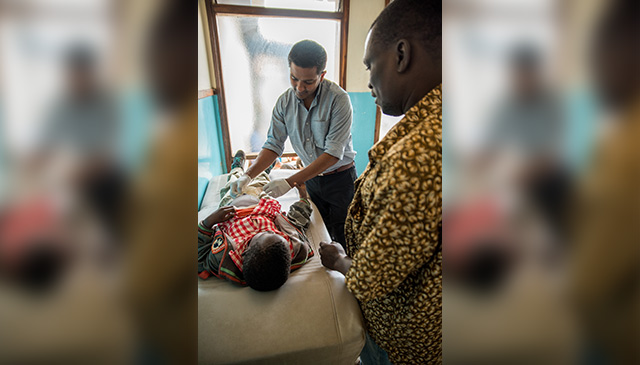
As COVID-19 continues to dominate the news, cause widespread closures and cancellations, and disrupt our normal way of life, it can be especially challenging for patients and their families who depend on us for their care. As we adjust to this new change, there’s one thing that has not changed – our commitment to ensuring our patients and families have convenient access to the care they need, when they need it.
One of the ways to help stop the spread of COVID-19 is to limit the number of patients and visitors at all of our locations across Texas – including hospitals, specialty care clinics, Pavilion for Women community clinics, Texas Children’s Pediatrics, Texas Children’s Urgent Care and The Centers for Children and Women. To keep everyone safe, many in-person visits can now be converted to a phone or video appointment. Texas Children’s e-Health team – in collaboration with other departments across the system – has rapidly expanded and enhanced e-Health services to make it easier and more convenient for patients to connect with a Texas Children’s provider without leaving their home.
“Providers are very eager and excited to offer virtual visits to ensure the continuity and convenience of care to children and women especially during these challenging times,” said Dr. Robert Ball, maternal fetal medicine physician and medical director of e-Health. “As more physicians are trained and enabled to provide virtual care to their patients, we are rapidly transforming the landscape across Texas Children’s.”
Texas Children’s providers and patients are taking advantage of the benefits of e-Health capabilities. On March 23, providers began having telephone appointments with patients. In the first three days alone, almost 2,500 patients were able receive care via telephone from the safety of their home across Texas Children’s Hospital, Texas Children’s Pediatrics and Texas Children’s Health Plan. On March 26, almost 1,000 providers across the hospital were introduced to training to be able to give face to face care through video visits to their patients. This is also expected to take off rapidly and be a “customer obsessed” solution for our patients. The roll out of video visits across care locations change how Texas Children’s delivers care, not just during this emergent time, but for the long-term.
With the demand for e-Health services on the rise due to COVID-19, our e-Health team, nurses and leaders have worked collaboratively to develop other strategies to meet our patients’ needs. Below is an overview of some of the enhancements that have been recently implemented:
COVID-19 Nurse Triage Line – This new feature allows parents of current patients to call 832-822-6843 (832-82COVID) if they think their child has symptoms or has been exposed to COVID-19. The line is available 24 hours a day, 7 days a week and operated by specially trained pediatric nurses. The nurses will triage calls, provide basic COVID-19 information, or schedule a video visit with a provider for further evaluation. The COVID-19 nurse triage line is for pediatric patients only.
Virtual Visits – To keep our patients, their families and our staff safe, many pediatric and women’s services in-person visits are now being converted to a phone or video appointment. If a patient’s appointment is a fit for either option, clinic team members will contact patients directly to provide more details. We encourage patients to continue to schedule appointments with their Texas Children’s providers, and to visit texaschildrens.org/appointment for more information about current options.
Texas Children’s Pediatrics (TCP): TCP has changed its scheduling work flow to have a physician review all appointment requests for the health and safety of all patients arriving at TCP locations across Houston, Austin and College Station. If a patient’s health screen indicates symptoms or exposure to COVID-19, TCP will convert the patient to a phone or video appointment. e-Health options are new for TCP practices and is growing quickly. Between March 12 and March 27, TCP completed 567 video and 1,653 phone appointments.
Texas Children’s Health Plan (TCHP): TCHP has also been focused on getting key provider communications pushed out, with the most important messaging being around supporting the delivery of telemedicine services. The Centers for Children and Women are conducting their visits via phone and have added nine trained providers to the ranks of approved physicians licensed to conduct video visits. Additionally, Texas Children’s telemedicine platform Anywhere Care has seen an uptick in patient visits. For more information about Anywhere Care, click here.
“The COVID-19 pandemic has really impacted the way we provide care,” said Texas Children’s Chief Information Innovation Officer Myra Davis. “This health crisis has presented an opportunity for us to leverage the benefits of e-Health. Historically our outpatient care has been provided at Texas Children’s locations, and e-Health has created a paradigm shift where we our meeting patients where they are.”
Ball has seen the benefits that e-Health offers to our providers and patients, especially those patients and families where physical access to a Texas Children’s facility can be difficult.
“I think e-Health has been an incredible game changer for us,” Ball said. “Everybody deserves a Texas Children’s provider, and this is an effective tool that we can use to create this opportunity for them.”
E-health Resources
Please visit Texas Children’s Coronavirus Connect page where you will find links to internal documents with updated information about COVID-19, as well as our e-Health Training and Resource page that includes information on telephone and video visit requirements, consenting, and FAQs.






